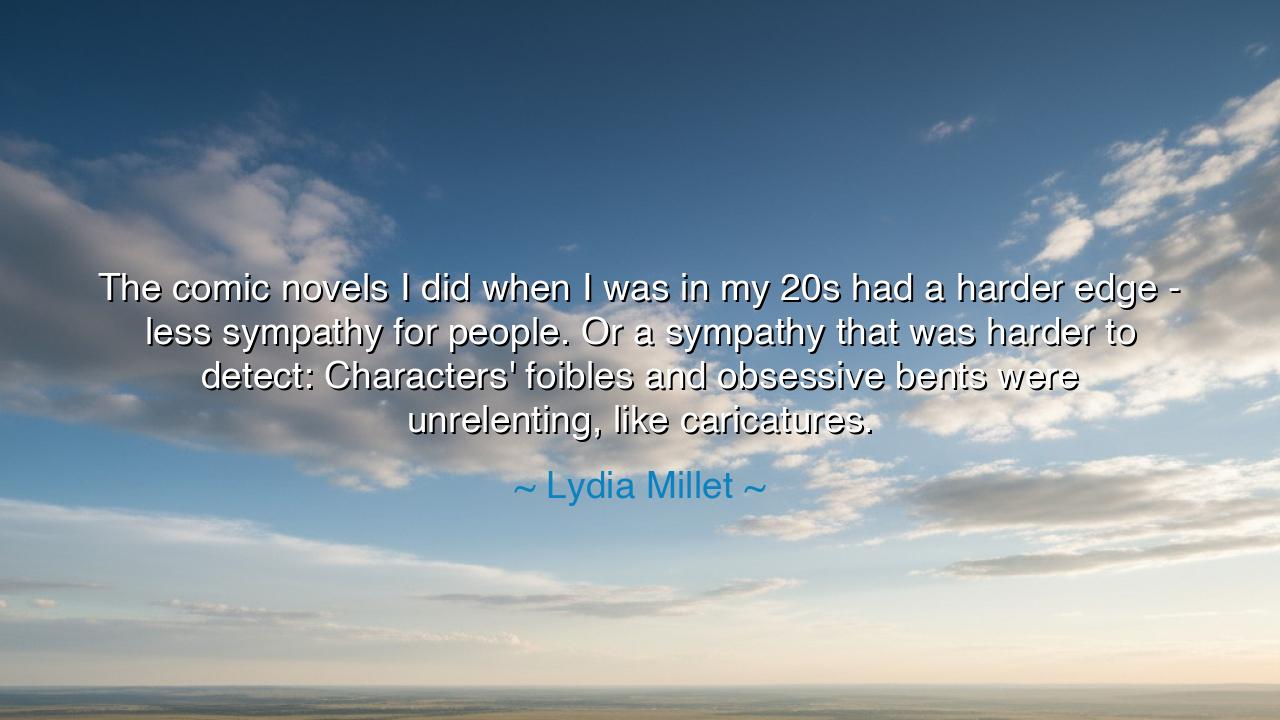
The comic novels I did when I was in my 20s had a harder edge -
The comic novels I did when I was in my 20s had a harder edge - less sympathy for people. Or a sympathy that was harder to detect: Characters' foibles and obsessive bents were unrelenting, like caricatures.






Hear, O lovers of wisdom and story, the words of Lydia Millet, who reflected upon her early art, saying: “The comic novels I did when I was in my 20s had a harder edge—less sympathy for people. Or a sympathy that was harder to detect: Characters’ foibles and obsessive bents were unrelenting, like caricatures.” These words are not only about literature, but about the journey of the human heart through youth, harshness, and the slow dawning of compassion.
The meaning is thus: in her youth, Millet’s writing bore the mark of sharp satire. Her characters were painted with strong lines, their foibles exaggerated, their obsessions mercilessly displayed. This style, hard-edged and biting, reflected a sympathy hidden deep, one not easily given, but buried beneath irony and critique. It is the way of many young artists—to see the world’s flaws more vividly than its tenderness, to expose weakness with unrelenting clarity, and to laugh at folly without softening it with forgiveness.
The ancients too knew this kind of art. Consider the comedies of Aristophanes, whose plays mocked politicians, philosophers, and even the gods themselves. His characters were not softened by compassion, but inflated into caricatures, their flaws magnified for the laughter of the audience. It was a sympathy difficult to detect, for his art did not weep with its subjects, but jeered. Yet even in this, truth was revealed, for satire forces us to confront our own ridiculousness, stripped of illusions. Millet’s reflection stands in this tradition: art as a mirror of folly, though a mirror that distorts so we may better see.
History also shows us the path of transformation. The writer Charles Dickens, in his early years, filled his works with grotesques and eccentrics, characters stretched into almost absurd shapes. But as he grew older, his pen softened; the same exaggeration carried warmth, and his sympathy became more visible. In A Christmas Carol, Scrooge is at first caricature, yet by the end he becomes humanized, transformed. Millet’s reflection hints at such an evolution—the journey from the sharpness of youth toward the tenderness that time and experience bring.
Her words also remind us that sympathy is not always absent when it is difficult to find. In satire, compassion may lie hidden, veiled beneath ridicule, waiting for the reader to search it out. For to exaggerate a flaw is also to recognize it, and in recognition there is a kind of kinship. When we laugh at the obsessive, the foolish, the relentless, we are also laughing at ourselves. Millet shows that sympathy need not always be overt; sometimes it comes as a whisper beneath the roar of mockery.
The lesson for us is this: do not fear the sharpness of youth, nor despise the softness of maturity. Each has its place. In youth, the world must sometimes be shaken awake by satire, its hypocrisies exposed with merciless wit. In maturity, there is room for compassion, for understanding the deeper wounds beneath folly. Together, these two modes form the whole: the wisdom to expose and the wisdom to forgive.
What then should you do in your own life? When you are young, do not be afraid to speak with sharpness, to call out what you see in the world, to expose folly where it thrives. But as you grow, remember also to temper that truth with gentleness, to see not only the caricature in others but also the wounded human beneath. When you read or listen to satire, search for the sympathy hidden within, and when you write or speak, ask yourself whether the edge you wield is meant to wound, or to awaken.
Thus let Lydia Millet’s words echo across generations: “A sympathy that was harder to detect.” For in them is the eternal lesson of art and life—that both laughter and compassion are needed to reveal truth. At times, we must mock to awaken; at other times, we must comfort to heal. And the greatest wisdom lies in knowing when to wield each.






AAdministratorAdministrator
Welcome, honored guests. Please leave a comment, we will respond soon